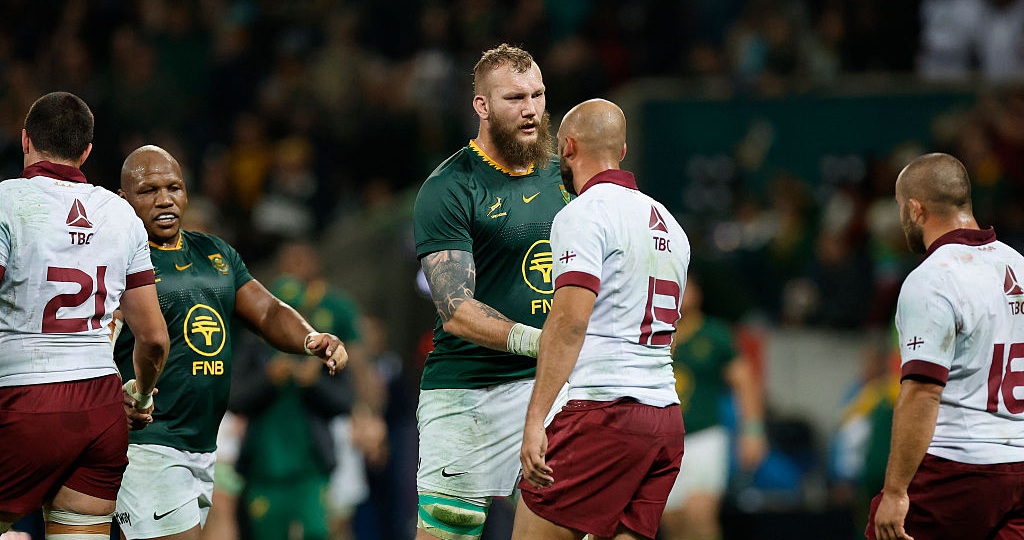
South Africa's lock RG Snyman (C) greets Georgia's centre Demuri Tapladze (2L) after their victory during the international rugby union Test match between South Africa and Georgia at Mbombela Stadium in Mbombela on July 19, 2025. (Photo by PHILL MAGAKOE / AFP) (Photo by PHILL MAGAKOE/AFP via Getty Images)
Springboks head coach Rassie Erasmus has announced a strategic pivot towards consistency following South Africa’s resounding 55-10 victory against Georgia in Mbombela. This decision marks the end of a period characterized by experimentation and frequent team changes, as the team gears up for the upcoming Rugby Championship.
The Springboks’ recent series, described by Erasmus as a blend of “science lab” and “demolition job,” saw the team cross for nine tries against the Lelos. However, Erasmus admitted that the experimental approach, which included a non-cap match against the Barbarians, had disrupted the team’s rhythm.
Reflecting on the Series
Reflecting on the four-match series, Erasmus expressed satisfaction with the overall performance, despite acknowledging areas for improvement. “We’re fairly happy if you look over the four games,” he stated. “We scored close to 50 points in each match and apart from the first Italy test defended pretty well.”
Despite Georgia’s physical and disruptive play, Erasmus emphasized the importance of understanding the impact of frequent team changes on performance. “If we chop and change teams like we have as we’re building squad depth, you’ll lose rhythm,” he noted.
Set Plays: 8 Scrums, 10 with 100% Scrum Win | 16 Lineouts, 14 with 88% Lineout Win | 9 Restarts Received, 3 with 89% Restarts Received Win
The coaching staff made significant changes to the squad in consecutive weeks, which, while providing opportunities to new players, hindered cohesion. “We found that again in the last 20 minutes and we can be fairly happy with the scoreline although one can always do better,” Erasmus added.
Looking Ahead to the Rugby Championship
With a 36-man squad set to be announced for the two-Test series against Australia, Erasmus confirmed a shift in focus towards refining the team’s core. “Within that squad there’ll be one or two guys that we experiment with, but the bulk of that squad will be experienced players who are suited to the way we want to play,” he explained.
This move represents a strategic effort to sharpen the team’s best side, drawing from a pool of approximately 48 players utilized this year. Erasmus highlighted the importance of providing opportunities to emerging talents like Jaden Hendrikse, Jordan Hendrikse, Quan Horn, and Renzo du Plessis.
“This was a series where we wanted to experiment a little bit so getting the scorelines we did is pretty satisfying. But the Rugby Championship is definitely a step up,” Erasmus acknowledged.
Addressing Individual Performances
The series concluded with the Springboks achieving a second consecutive 45+ point win, following their 45-0 triumph over Italy. The team ended the July series with 22 tries scored and just four conceded. However, one notable outlier was flyhalf Sacha Feinberg-Mngomezulu’s goal-kicking performance, with only one successful conversion out of five attempts.
Erasmus provided context for Feinberg-Mngomezulu’s off-day, revealing that the young player had sustained a hip pointer injury during the warm-up. “We weren’t quite sure if we should push him through the game, but he wanted to play — but that’s not an excuse for the way he kicked at poles,” Erasmus explained.
Despite the setback, Erasmus praised Feinberg-Mngomezulu’s willingness to take risks and push boundaries. “He ran it out and we like guys that try things and not just play safe, and he’s certainly not one of the guys that made the most errors,” he added.
Implications and Future Prospects
The decision to focus on consistency comes as the Springboks prepare to face tougher competition in the Rugby Championship. This strategic shift aims to solidify the team’s strengths and build on the momentum gained from the recent series.
As the Springboks look ahead, the emphasis will be on developing a cohesive unit capable of competing at the highest level. With a blend of experienced players and promising newcomers, Erasmus’s approach seeks to balance immediate success with long-term development.
In the coming weeks, the rugby world will be watching closely as the Springboks embark on their journey through the Rugby Championship, eager to see how this new focus on consistency will impact their performance on the international stage.







